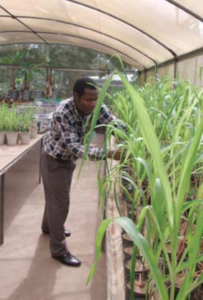Agricultural research on Nematods made possible thanks to AGORA
The first thing agricultural researcher Edward Oyekanmi did when he began his job at a new university was to ensure that the staff and students had access to Research4Life’s AGORA programme.

As a PhD student at the University of Ibadan, Edward Oyekanmi was lucky enough to have access to AGORA. Acutely aware of how important this was to him as a student, it is no surprise that one of the first things he did after starting his job at Wesley University of Science and Technology in 2009 – less than a year after the university opened – was to convince management that AGORA was a necessity.
Thanks to Mr Oyekanmi’s encouragement, the university invited the West African representative of the Information Training and Outreach Centre for Africa (ITOCA) to present a seminar on Research4Life. Prior to this, Wesley had little awareness of these programmes. Management quickly comprehended their immense benefits and the university successfully applied for access.
Mr Oyekanmi has almost completed his PhD research on the management of plant parasitic nematodes in maize, thanks in no small part to AGORA, which greatly boosted his access to up-to-date literature from around the world. AGORA has also allowed him make rapid progress on his other research, which includes work on organic agriculture, biopesticides and biofertilizers.
“As a young scholar, in my six years of access to this Research4Life electronic library,” he says, “I already have 10 publications to my credit in reputable international and national journals.” « AGORA, HINARI and OARE are the tripod on which our scientific community stands, » he adds.
Furthermore, he is drumming into his Wesley students the importance of comprehensive literature searches, insisting that AGORA must be consulted when writing up their assignments and scientific reports. Mr Oyekanmi firmly believes that with continuing support for Research4Life from publishers and funding agencies, Wesley can achieve its goal of becoming a world leader in scientific research.
“The high impact of Research4Life activities is felt mostly in the developing nations, where poverty is pandemic and health challenges are on the increase,” he says. “Access to scientific information is expensive, and many researchers in developing nations cannot afford it.”
Mr Oyekanmi suggests that tools such as AGORA will be instrumental in Africa’s scientific development.
“I do hope,” he says, “that Research4Life will continue to reach out to the unreached in the developing nations so that access to scientific information will be affordable.”
This story is part of the Making a Difference case study collection. Read more stories from Research4Life users.





